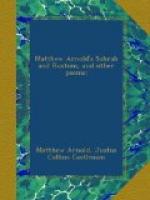But, children, at midnight,
When soft the winds blow,
125
When clear falls the moonlight,
When spring-tides are low;
When sweet airs come seaward
From heaths starr’d with broom, deg.
deg.129
And high rocks throw mildly
130
On the blanch’d sands a gloom;
Up the still, glistening beaches,
Up the creeks we will hie,
Over banks of bright seaweed
The ebb-tide leaves dry.
135
We will gaze, from the sand-hills,
At the white, sleeping town;
At the church on the hill-side—
And then come back down.
Singing: “There dwells a loved one,
140
But cruel is she!
She left lonely for ever
The kings of the sea.”
TRISTRAM AND ISEULT deg.
I
TRISTRAM
Tristram. Is she not come deg.? The
messenger was sure—
Prop me upon the pillows once again—
Raise me, my page! this cannot long endure.
—Christ, what a night! how the sleet whips
the pane!
What lights will those out to the northward be deg.?
deg.5
The Page. The lanterns of the fishing-boats at sea.
Tristram. Soft—who is that, stands by the dying fire?
The Page. Iseult. deg. deg.8
Tristram. Ah! not the Iseult I desire.
* * * * *
What Knight is this so weak and pale,
Though the locks are yet brown on his noble head,
10
Propt on pillows in his bed,
Gazing seaward for the light
Of some ship that fights the gale
On this wild December night?
Over the sick man’s feet is spread
15
A dark green forest-dress;
A gold harp leans against the bed,
Ruddy in the fire’s light.
I know him by his harp of gold,
Famous in Arthur’s court deg. of old;
deg.20
I know him by his forest-dress—
The peerless hunter, harper, knight,
Tristram of Lyoness. deg.
deg.23
What Lady is this, whose silk attire
Gleams so rich in the light of the fire?
25
The ringlets on her shoulders lying
In their flitting lustre vying
With the clasp of burnish’d gold
Which her heavy robe doth hold.
Her looks are mild, her fingers slight
30
As the driven snow are white deg.;
deg.31
But her cheeks are sunk and pale.
Is it that the bleak sea-gale
Beating from the Atlantic sea
On this coast of Brittany,
35




